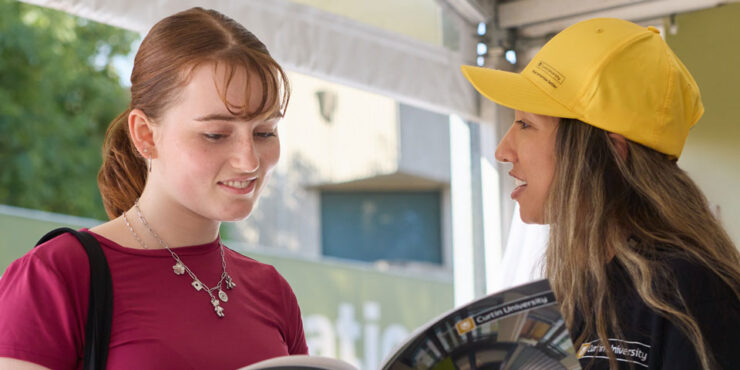Course overview
Occupational therapists work with people of all ages who may have experienced injury, illness or disability. They help people to engage in occupations or activities that are meaningful to them and to achieve independence, better health, wellbeing and satisfaction in their lives.
In this course, you will learn to identify the physical, psychosocial, cognitive, behavioural and environmental factors that can help or hinder participation in everyday activities. You’ll also gain the collaboration skills needed to provide cross-disciplinary care focused around the client and their needs.
Career outcomes
Occupational therapist roles across Australia are expected to grow by almost 33% by 2034.¹
Careers
- Occupational therapist
Industries
- Acute care
- Disability services
- Injury management
- Mental health and wellbeing
- Rehabilitation
- Aged care
- Child health
¹ Source: Jobs and Skills Australia – Employment Projections.
Professional accreditation and recognition
This course is recognised by the World Federation of Occupational Therapists. Graduates using the titles registered health practitioner or occupational therapist must be registered with the Occupational Therapy Board of Australia.
Why study at Curtin?
Work experience
Build your practical expertise through 1,000 hours of fieldwork placements. You can even travel while you learn, with our Health Science Global Experiences.
Professional recognition
Your degree is recognised by the World Federation of Occupational Therapists.
Highly ranked course
Of WA's public universities, we rank first for graduate salary and equal first for full-time employment for undergraduate rehabilitation. (Good Universities Guide 2026)
Hear from our students
"What drew me to Occupational Therapy is its versatility and the ability to practice in many areas – including aged care, working with kids, disability, mental health, neuroscience and hand therapy. This means I can explore different specialties and find the one that resonates most with me. We have amazing facilities available to us, including the lab rooms, OT-specific rooms and study spaces. Most classes are very interactive, and the support provided by the tutors is invaluable."
Becca Codd
Bachelor of Occupational Therapy (Honours)
Your student experience

Work-integrated learning at Curtin: explore a Universe of opportunity
Develop real-world experience before you graduate. Learn how work-integrated learning helps you build career skills and connect with industry early.

Thinking about uni? Five reasons Curtin could be your best move
Not sure if uni is for you? Explore five clear reasons students choose Curtin – from flexible pathways and support to real-world skills and outcomes.

Find your entry pathway to Curtin
You may be finishing high school, coming from TAFE, or just thinking of a career change; but whatever your background, there’s an entry pathway to Curtin for you.
Upcoming events

29 March 2026
Curtin Open Day
Curtin Perth
Discover where in the world a Curtin Degree can take you at Curtin Open Day. Explore courses that connect with industry, meet people who can guide your career direction and see how your ideas can become a reality.
Course structure
Practical learning
Throughout your studies, you’ll learn in laboratories, simulation learning spaces and resource rooms tailored for gaining occupational therapy skills. You’ll also complete approximately 1,000 hours of fieldwork in clinical and industry settings.
In your third and fourth years, you'll participate in group professional projects. High-achieving students may have the option of an honours project, working under staff supervision to complete, and potentially publish, a small research study.
Detailed course structure and unit information
For detailed information and course structure, visit our Handbook.
Your career as an occupational therapist
Working with children: Help children achieve their developmental milestones such as fine motor skills and hand-eye coordination. Educate and involve parents, carers and others to facilitate the normal development and learning of children.
Rehabilitation and aged care: Help clients regain or enhance their daily lives after an event such as hip replacement or stroke. Assess and modify clients’ home and community environments to improve their safety and independence.
Acute care: Assess clients’ cognition, function and psychosocial needs. Monitor clients’ function and progress, prescribing adaptive equipment to ensure safety upon discharge from hospitals.
Injury management: Use specialised assessments to determine the functional requirements of various jobs, and clients’ capacity to return to work. Design and coordinate graded return to work programs. Educate clients in safe work practices. Modify the work environment to suit the needs of individuals to prevent or minimise injuries.
Mental health: Design individual and group programs and activities to enhance clients’ independence in everyday activities. Develop coping strategies for clients in overcoming their mental health issues.
Entry requirements
To study this course, you must meet the entry criteria:
- course ATAR, or equivalent, demonstrated via an accepted entry pathway
- any course-specific requirements
- English language requirement.
Minimum ATAR entry required
This course requires you to achieve a minimum ATAR/selection rank to be considered for entry, but does not guarantee selection.
Entry pathways
There are different ways to meet our academic entry requirements. Choose the option that best suits the highest level of education that you’ve achieved.
Curious how students entered this course? See the entry pathways other students have taken.
Course-specific requirements
You’ll also need to meet any specific requirements to be eligible to apply for this course.
Study credit and support
You may be able to receive study credit or support based on your previous experience or personal circumstances.
Get credit towards your degree
You may be able to receive credit for recognised learning (CRL) from past study or professional experience, which could reduce the time it takes to finish your course.
Find specific details about CRL for this course on the Handbook.
Special consideration
If your studies were affected by circumstances beyond your control, you may be eligible for special consideration when applying to Curtin. This process is available to new applicants only and allows your application to be assessed in light of those circumstances.
Additional information
Notes about this course
Make sure you check the course notes for any other important information.
Fees
2026 Domestic indicative fees
*The indicative first-year fee is based on a standard full-time study load of 200 credit points.
This fee is a guide only. Your total fee may vary depending on the units you choose, your study load or if your course includes additional requirements. For more information on fees, see other fees and charges.
Scholarships
Get the support you need to succeed with our diverse range of scholarships. Whether it’s financial support, assistance with relocation, or recognition for your academic achievements, we have scholarships tailored to your unique needs.
How to apply
Follow these steps to make sure you’re eligible, prepared and ready to apply for your course.
Check entry requirements
Entry requirements differ by course and your previous work and study experience.
Prepare your documents
The documents you need may vary depending on your course and application pathway.
Check application deadlines
Deadlines vary by course and whether you’re applying as a domestic or international student.
Choose your application pathway
I’m in year 12 or applying for Medicine
If you’re in year 12 or recently finished high school, you’ll need to apply through TISC.
You’ll apply through TISC no matter what you studied in high school, whether that was:
- ATAR
- General subjects
- Certificate IV
- or completing UniReady in Schools program.
TISC has different application dates to Curtin. Visit the TISC website for all important dates, including application deadlines.
I have finished high school
If you’re not a current year 12 student or recent graduate, you’re considered a non school leaver and you’ll apply directly to Curtin.
The only exception is Medicine, which must be applied for through TISC.
You’ll apply directly to Curtin if you are:
- a high school graduate who finished school last year or earlier
- transferring from another university
- returning to study or using your professional experience to qualify
- progressing from a VET or TAFE qualification or bridging program
- a current Curtin student changing courses or campuses.
Application deadlines can vary by course. Make sure to check application deadlines before you apply.
Express your interestExplore more
Find more resources to help you take the next step in your Curtin journey.